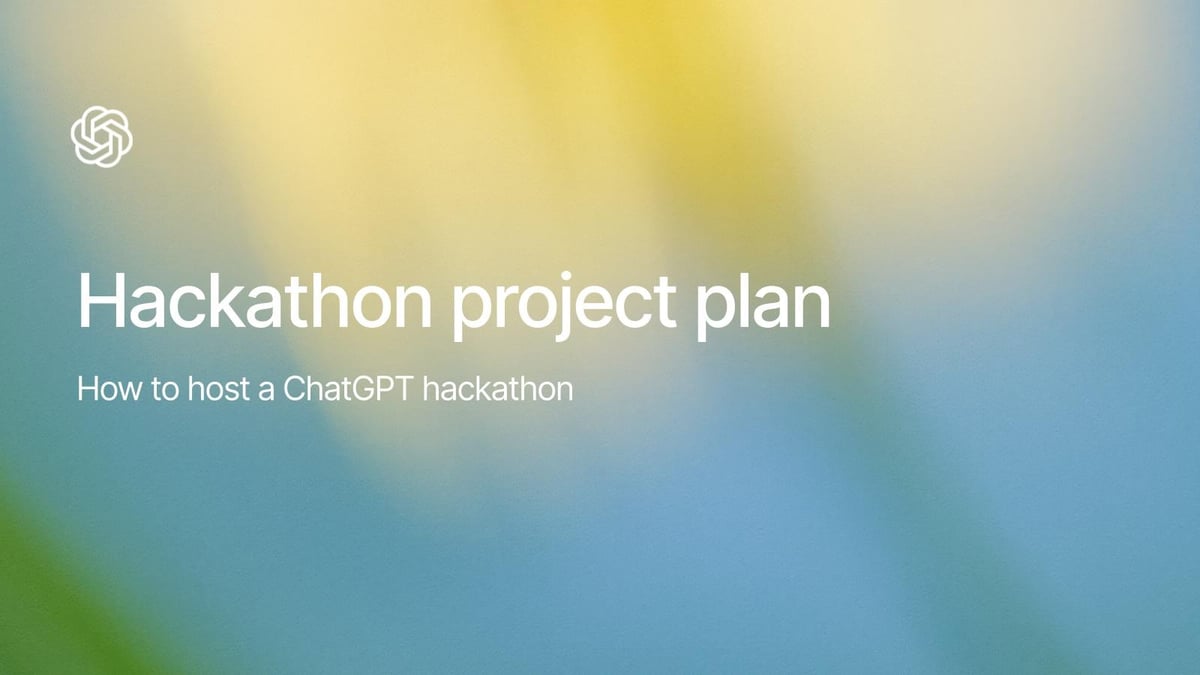Hackathon project plan

# Higher Education
How to host a ChatGPT Hackathon
August 22, 2025 · Last updated on August 26, 2025
Hackathon Project Plan
Hosting a Hackathon offers participants dedicated time and space, either for a half or full day, to deeply explore and gain hands-on experience in building GPTs within ChatGPT.
Details
The ChatGPT Hackathon is designed to demonstrate how students and faculty can creatively use GPTs to enhance their work and add value. This event aims to share knowledge, inspire innovative applications, and foster a collaborative environment.
Participants
The hackathon participants should ideally include all ChatGPT Edu license holders. However, you can choose to focus on specific teams, departments, or include the entire campus community, depending on your objectives. Involving faculty and student leaders is recommended to emphasize that AI adoption is a priority for your institution.
Goals and success metrics
Examples of Hackathon Goals:
- Foster excitement and collaboration around ChatGPT among students and faculty.
- Provide participants with hands-on experience in building custom GPTs.
- Develop an initial set of GPTs that will have a meaningful impact on academic and campus activities.
Examples of Success Metrics:
- Percentage of invited participants (students and faculty) who join the hackathon.
- Percentage of participants who submit a GPT for prize consideration.
- Number of GPTs submitted.
- Percentage change in ChatGPT usage before and after the hackathon.
- Percentage change in weekly active users before and after the hackathon.
- Number of conversations using GPTs before and after the hackathon.
Examples of Creative GPTs for Hackathon
- The Research Guru: A GPT that not only finds academic articles but also crafts custom research questions, suggests collaborators, and guides you through publishing your work.
- Brainstorm Ninja: A GPT that energizes group projects with creative prompts, role assignments, and project timelines, ensuring seamless collaboration and productivity.
- Event Mastermind: A GPT that turns event planning into an art, generating themes, coordinating logistics, and predicting optimal times and venues for maximum impact.
- Career Pathfinder: A GPT that acts as your personal career strategist, uncovering unique opportunities, crafting standout resumes and pitches, and connecting you with internships and mentors.
- Language Explorer: A GPT that makes language learning immersive and fun, offering daily challenges, cultural context, and virtual exchange sessions with international peers.
Sample Project Plan
This template, created by OpenAI, is designed to help institutions plan and run an Education Hackathon. It provides a structured framework for organizing objectives, participants, and success metrics, making it easy to adapt for your own campus or project needs.
AI & Education Hackathon Overview
The Hackathon offers participants dedicated time and space, either for a half or full day, to deeply explore and gain hands-on experience in building GPTs within ChatGPT. It is designed to demonstrate how students and faculty can creatively use GPTs to enhance their work and add value. This event aims to share knowledge, inspire innovative applications, and foster a collaborative environment.
Participants
The hackathon participants should ideally include all ChatGPT Edu license holders. However, you can choose to focus on specific teams, departments, or include the entire campus community, depending on your objectives. Involving faculty and student leaders is recommended to emphasize that AI adoption is a priority for your institution.
Goals and success metrics
Examples of Goals:
- Foster excitement and collaboration around ChatGPT among students and faculty.
- Provide participants with hands-on experience in building custom GPTs.
- Develop an initial set of GPTs that will have a meaningful impact on academic and campus activities.
Examples of Success Metrics:
- Percentage of invited participants (students and faculty) who join the hackathon.
- Percentage of participants who submit a GPT for prize consideration.
- Number of GPTs submitted.
- Percentage change in ChatGPT usage before and after the hackathon.
- Percentage change in weekly active users before and after the hackathon.
- Number of conversations using GPTs before and after the hackathon.
Examples of Creative GPTs for Hackathon:
- The Research Guru: A GPT that not only finds academic articles but also crafts custom research questions, suggests collaborators, and guides you through publishing your work.
- Brainstorm Ninja: A GPT that energizes group projects with creative prompts, role assignments, and project timelines, ensuring seamless collaboration and productivity.
- Event Mastermind: A GPT that turns event planning into an art, generating themes, coordinating logistics, and predicting optimal times and venues for maximum impact.
- Career Pathfinder: A GPT that acts as your personal career strategist, uncovering unique opportunities, crafting standout resumes and pitches, and connecting you with internships and mentors.
- Language Explorer: A GPT that makes language learning immersive and fun, offering daily challenges, cultural context, and virtual exchange sessions with international peers.
Awards (optional)
To make the event more fun and engaging, consider creating 3-5 award categories that participants can submit their custom GPTs for. These awards can also help emphasize key educational priorities or values that you want participants to consider as they build their GPTs. Examples might include: Academic Enhancer, Efficiency Booster, Community Builder, and Most Innovative.
Event schedule
Phase | Action Item | Timing |
Pre-event | Announce event | 3-4 weeks before event |
Hackathon day | Welcome (from Executive Sponsor) | 5 mins |
Agenda review (by Event Lead) | 5 mins | |
Custom GPT overview by OpenAI | 45 mins | |
Hackathon | 2-4 hours | |
GPT show & tell | 60-75 mins; 5-8 mins per team | |
Wrap-up (by Event Lead) | 5-10 mins | |
Post-event | Vote for your favorite GPTs! | 3-5 day voting window |
Winners announced! Leadership Readout | Via email or upcoming meeting ~4 weeks after the event |
Preparing for the event
Phase | Task | Owner | Due date |
Pre-event | Review project plan with working group and align on event goals and success criteria | Event Lead / OpenAI | (Suggested: 4 weeks before event) |
Finalize event date, location, participants, and awards | Event Lead | (Suggested: 3.5 weeks before event) | |
Send internal communications to participants announcing event | Executive Sponsor | (Suggested: 3 weeks before event) | |
Send calendar invitations for event | Event Lead | (Suggested: 3 weeks before event) | |
(Optional) Finalize prizes for awards | Event Lead | (Suggested: 2 weeks before event) | |
Pre-event check-in | Event Lead / OpenAI | (Suggested: 1 week before event) | |
Send out hackathon submission form | Event Lead | (Suggested: Day-of event after Custom GPT Overview session) | |
Post-event | Send out voting form (build based on submissions) | Event Lead | (Suggested: Immediately following event) |
Announce hackathon winners! | Event Lead + Executive Sponsor | (Suggested: 1 week after event) | |
Internal Team Retrospective | OpenAI | (Suggested: within 1 week after event) | |
Leadership Readout (review use cases, success metrics, ROI) | Event Lead / OpenAI | (Suggested: 4 weeks after event) |
Table Of Contents
Popular
Dive in
Related
Resource
ChatGPT Edu Launch Guide for Higher Ed Universities
By Kirk Gulezian • Aug 22nd, 2025 • Views 24.6K
Resource
ChatGPT Edu Launch Guide for Higher Ed Universities
By Kirk Gulezian • Aug 22nd, 2025 • Views 24.6K
